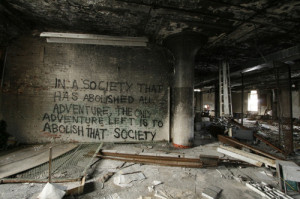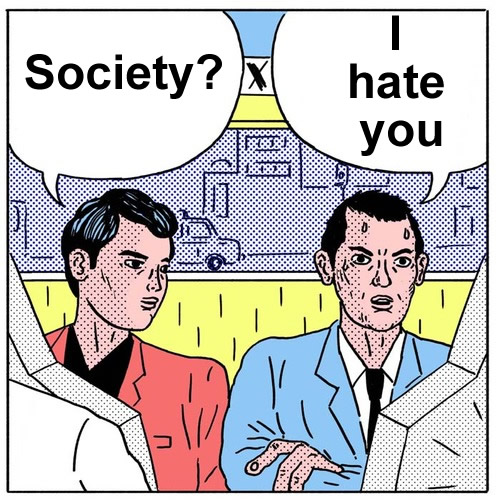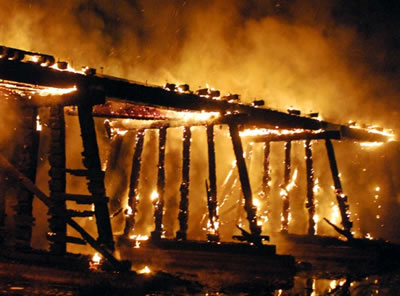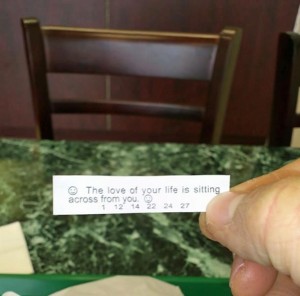Earlier this week I gave a presentation at the Anarchist Studies Network conference which was an interesting use of my time. It was my first time talking to a crowd (it looked to be about 15-20 people) via Skype. That was unpleasant. It was also an excuse to put some of my thoughts down about Occupy, now that it is over. Now I share those thoughts with you.
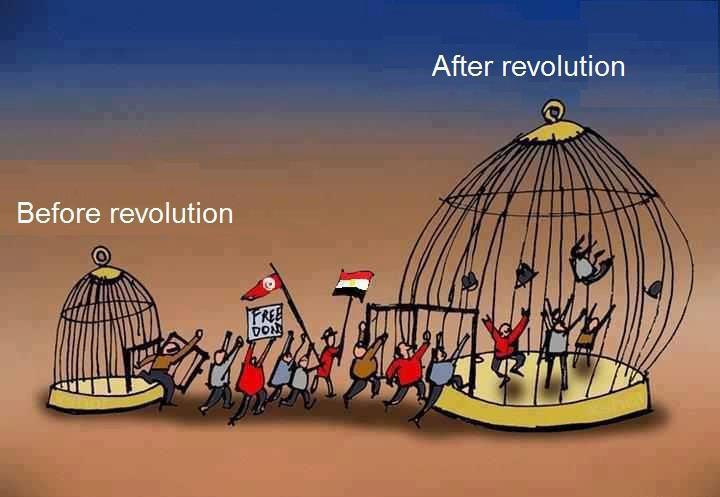
I am going to call this a reportback as I will be sharing quite a bit of rough information with you all, including some thoughts about a presentation by Decolonize Seattle that I attended just last evening in Oakland that is worth referring to in regards to lessons on Occupy.
While I am not an activist I have had first row seats for the activities of Occupy Oakland and occupation activities in Greece, Barcelona, Greensboro North Carolina (just barely avoiding a SWAT team there), and Santa Cruz, CA. In January of this year I put together and published a book on anarchist involvement in Occupy called Occupy Everything: Anarchists in the Occupy Movement with LBC Books. In my not so humble opinion this book provides a comprehensive broad anarchist approach to an Occupy Movement that extends back in time far before 2011 and will continue to be a tactic (like blocing up, blockading, and sabotage) that anarchists will use into the future.
Given that I live on the West Coast of the US I may have different assumptions about what comprises anarchist activity and intervention in Occupy than other US or UK anarchists. Our center of gravity was never Wall Street, per se, or David Graeber (who only received lukewarm response when he spoke in Oakland) but the violence of the OPD, the memory of Oscar Grant (a young man killed by our local transit police on New Years Eve 2009), and the port of Oakland. Obviously there is explicit linkage between the west coast threads of occupy and those in the rest of the country, but the priorities are different here as are the political radicals. The Bay has decades of active radical political history with no real break from the Vietnam-era to today (with a surprising number of people from that era still active). This provokes a very different atmosphere than anytown USA where the most radical people in town are still demanding a recount of the 2000 election.
The specific anarchist energy that was so infectous in Occupy Oakland had a specific history of interventions from the past few years. Anarchists have been involved in the events immediately following the Oscar Grant killing (which included a few near riots in Oakland during the all-too-common clearing of the killer police officer from responsibility for the action). They were involved in the University of California student occupations of 2009-2010, which were recorded in the publication After the Fall Communiques from Occupied California. Finally, prior to the start of Occupy, they were involved in a series of Bay of Rage actions that were surprisingly prescient.
These were specifically organized in the Summer of 2011, prior to Occupy Wall Street but after the Arab Spring in North Africa and Indignado Summer around Europe. These events were organized around targets of austerity cuts, including the Oakland Library (which involved the first of several book blocs in the US context including a second one @ UC Berkeley), increasing police violence as a form of social control, and (humorously) a protest around our local regional train service BART for cutting off cell phone access in their system (this was a panicked response to an earlier protest).
Like many other radicals these people were energized and focused by the Occupy Wall Street phenomenon and called for an occupation of the town hall area of Oakland (formerly Frank Ogawa Plaza, now forever remembered as Oscar Grant Plaza). I am not going to belabor the story of Occupy Oakland any more than I have since its arc wasn’t that different of a story from other occupations in North America with a fairly brief occupation, heavy-handed police eviction, and another few months of something called occupy that really didn’t occupy much of anything at all.
I want to be constructive with my review of the lessons of Occupy but my focus is going to be specific to anarchists. I am an anarchist partisan and while there are broader Occupy lessons for a radical, or activist, crowd, I am not concerned with them. I am concerned with what the future of anarchist intervention holds and consider the sustainability of our public presence, relevance, and agility as more important factors in evaluating the lessons of Occupy than meetings with politicians or the attention of non-profits.
Let us begin.
One – The strategic importance of a anti-police presence
The 99% vs 1% rhetoric was a master stroke of populist propaganda. It said clearly in a few words what class-oriented radicals say have been attempting to say in volumes for years. 99% was fantastic branding but like other branding, it worked better as establishing the product than it did at solving the problems confronted by the situation. No one is to blame for the situation but with Occupy the experience was, again and again, that the successes also embedded the failures.
During the actual Occupation of OGP Occupy Oakland had an informally agreed upon but consistent practice of not allowing uniformed police inside of the occupation. This entailed several stand-offs with hand-held barricades, and general confusion among the OPD brass (as highlighted in a variety of leaked documents, some of which are recounted in the local anarchist publication, Lawless).
Externally this stance established #OO as the most militant of Occupy in the US. This is all fine and good, and histories of Occupy will retell histories of the BPP, Oscar Grant, and the upcoming federal take-over of the OPD but that is what history does… uses unrelated historical high points to make history’s points. In point of fact there was never an “Occupy Oakland’s Collective Decision-Making Process” agreement to the anti-police practice. It was something agreed upon by many of the militants and acted upon in the moments when the OPD came around but probably never would have passed the 90% threshold necessary to have been approved.
Internally the anti-police stance accomplished much of the goals of anarchist agitation without ever having to confront the lack of understanding people have of anarchism itself. It gave a practice to anarchist aspirations of generalized hostility toward authority and made sense in the context of police violence in Oakland as it would have in most densely populated cities in the US.
This ambivalence around what turned out to be such a central differentiator between #OO and much of the rest of Occupy also relates to another lesson that we will get into a bit later.
Two – The US’s very small appetite for politics
It is a trite truism that the US is filled with uneducated, religious, apolitical people who only grudgingly attend the ballot box every four years, mostly sitting jaw agape staring at screens being entertained and pacified by Murdoch, Viacom, Time Warner, CBS, and Disney. Obviously this falsehood conceals the moment of truth that keeps our hobbled liberal elites wringing their hands, making jokes, and pathetically air boxing against powers that are utterly indifferent to them.
Back on point. Whether it is the true existential character of the American (to be disinterested in the economic & political machinations that frame their existence) or due to the activities of Beelzebub, Amadeus, and Moloch acting behind the curtain of pop culture and news-as-misinformation… politics is not a dish appreciated on the American table. It took very little time, during Occupy in 2011, before the mainstream narrative of Occupy changed from a lovable gang of misfits of adorable union losers, college kids, and left-of-liberals into a scary gang of people of color and athletes dressed in black who didn’t like newspaper boxes or windows. This stuff really does play well in Peoria.
But by the end of the year there just weren’t many photo ops left for Occupy. It finally got cold outside and the crowds retreated back to warm screens. More importantly there were fantastic political photo opportunities for nearly six months in the form of the Republican primaries. Every dramatic turn prior to the eventual crowning of Mitt Romney as the loser of the 2012 general election had a narrative written by prime time screen writers for a prime time audience. There is no audience for a second political thriller when the first one has all the special effects, writing, and victory at the box office for over 200 years…
The anarchist lesson here is a difficult one of strategy. Clearly long-term thinking has never been a strong suit but the conversation should have started earlier about how to intervene in the non-discussion around the 2012 election season in more interesting and hostile ways. Perhaps the smartest thing to do is take the year off and wait out the hundreds of millions of dollars that is going to be spent on more-of-the-same.
Three – Decolonize
There was something uncomfortable about the language of Occupation from the first moment Wall Street was attempted to be Occupied. It just doesn’t sit right to take land and call it yours when the people who were robbed of it, usually at gunpoint, in the first place are still fighting genocide and occupation of native land. The brand name Occupy clearly had precedence over the nuanced concern over a little matter of genocide so the story continued.
Except it didn’t, of course. A couple of cities started up with Decolonize as their name for take-overs, and never had an Occupy in their town, but primarily these were smaller events in the South west and they never really had the national press that NY or Oakland had. They stated their case but mostly went unnoticed. Eventually however, decolonize vs occupy became a central conflict in several cities. This story played itself out during the waning period of Occupy but the venom and acrimony it involved was great in proportion to the number of people involved or energy spent on the topic.
The reason for this is because decolonize became the super-saturated way in which to talk about racial issues in the context of what had been a primarily an economic discussion. Obviously race, being a quintessential American concern, was always part of the Occupy discussion but as a secondary issue behind the economic travesty done upon the US by the banks and financial institutions. Decolonize gave the topic claws which nearly tore Occupy apart–or perhaps it did, as, at least in Oakland, there was a marked downturn in GA attendance after the decolonize proposal infamously failed to pass by the 90% required for consensus.
The situation gets additionally murky the more details emerge about the infighting, partisan struggles, and single issue groups that used decolonize as a mechanism to say what they wanted to about Occupy all along (to whit, that it was a primarily white, male, urban, middle-class phenomenon) but decolonize demonstrates a very 2012 example of a very old problem for US radicals. We don’t have an agile response to either bad faith accusations of racism or good faith demonstrations of insensitivity, structural inequalities in our groups, or accusations of cultural myopia. We usually act in a reactionary manner to either of these, and conflate the real with the polemical.
In the case of decolonize the lesson is that phenomenon do reflect their cultural point of origin and in the US, the time period that Occupy had before dissipating was far too short to allow for the kind of pivot necessary to include the very real criticism that its economic orientation was not framed in a way that made sense to non-land owning, non-white people.
Four – The end of consensus
Since the 80s US anarchism has been plagued by the spectre of consensus. In a culture that is deeply functionalist in orientation, having a quick-and-dirty answer to questions like “how will you act without leaders?” was important. It meant that consensus took on a role that it wasn’t particularly suited for but that could be duct taped into place, with additions like spokescouncils for larger groups and modified consensus for less philosophically rigid groups.
Consensus is still the language scattered throughout Occupy and the language and jargon of Occupy but it is clear that many, if not most, anarchists have largely abandoned formal consensus, consensus by large numbers, and consensus as a fundamental principle of anarchist decision-making. Perhaps this opens a can of worms but this division is also about the division between anarchists who see anarchism as a kind of direct democracy or who use democracy, even “real” democracy, interchangeably with anarchism and those who don’t.
This conflict will play itself out on several fronts now and into the future but the hegemonic model of consensus is over and the fractures in consensus as displayed during Occupy activities are instructive. I’ll give two examples, both from #OO . When the initial decolonize proposal was made to #OO it was met with general friendliness. It was generally assumed that changing the name of #OO to #OO/DO was a pure formality. There was little doubt that it would happen. Then the presentation began. The presenters brought several new-to-OO people and seemed to believe that the audience was going to be hostile so from the onset were aggressive to the point of haranguing on points where there was no real disagreement. As a result of defensiveness and moralistic hostility the inevitability of the transformation into decolonize was derailed but only barely. There was perhaps a 70 to 80% super-majority but not quite the 90% that represented (modified) consensus in #OO. This disillusioned strong supporters of decolonize, demonstrating that strong “yes” votes can’t negotiate with ambivalent “no” votes, and that consensus works better as a principle than as a practice.
Perhaps obviously you aren’t ever going to get a group composed of several hundred strangers to agree to a Black Bloc. You may get them to agree to a diversity of tactics, although this seems increasingly unlikely in the future, but never to actual property destruction or confrontation with the police. This is fine, it isn’t for everyone, etc, etc. But the logic of diversity of tactics ends up cutting both ways. For every person who just wants to street fight there is another person who wants nothing to do with fighting the police. Diversity of tactics means that these two sets of people, who represent but two of dozens of different motivated interests, have fewer and fewer reasons to meet at all. Their reasons for being part of Occupy are different to the point of being unrelated. Consensus isn’t relevant for their shared project any more because, over time, they don’t have one.
The language for this, that also has a rich anarchist history, is autonomous activity. We can use this language, and the practice of organizing in small groups that can determine their own logic, to permit dozens of different approaches to the same problems that Occupy raised. Autonomous groups have participated in Black Blocs, small occupations of local schools and libraries that are being shuttered by the city, farm occupations, and recently started a new fuck the police (FTP) assembly that is as large, if not larger, than the remnant of Occupy Oakland that’s still active.
I don’t want to fitter away your attention so I’ll stop at four lessons but obviously there are more that could be discussed including anarchist lessons about violence, how to use and abuse the media, identity politics, and thinking strategically while honoring our autonomous tradition. Thanks for your time.


